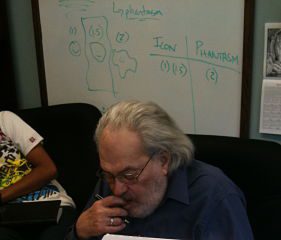
Education is a human activity and the heart of education is the relationship between the teacher and the student. Socrates and Glaucon, Jesus and John: history is made, in part, by the profound mentoring and discipleship that happens when a great teacher meets a willing learner.
This process cannot be automated. My first college papers were in longhand on three-ring notebook paper and then school demanded that all work be done on typewriters. I complied and my papers looked better, but the fundamental relationship between Dr. Schults and me did not change.
He kept helping me read texts and showing me the way to love Jesus and great ideas.
During my time with Al Geier or Deborah Modrak, puzzling over Republic or understanding Aristotle on substance, I moved from typewritten work to word processing (Word Perfect!), but talking to Al or Deborah was still the core of my education.
Class with Dr. Geier or Dr. Modrak was different, because they were different. I cherish having learned from different voices . . . and I could multiply those voices to count the many effective teachers I have had. Those voices can use Skype; I have taken profoundly moving seminars with Dr. Geier using Skype. A relationship can grow over email or text communication: a lifetime friendship with Phil Johnson began over email. Personal education used different tools, but was still personal. An email from Phil was nothing like an email from Fred or Paul or Donna.
Having started two programs that functioned on-line, examined most of the major players, and read all I can on the topic, I have found one rule that separates the frauds from those that are real education. Teachers remain in charge of their virtual classroom. They pick the texts, they can deviate from the chosen topic and they have a “load” of students that allows for personal relationships.
You cannot mechanize a CS Lewis talking to Sheldon Vanauken. You cannot capture what Jesus said to John and assume the same words are what He would have said to Peter.
As a result of my experience, here are three questions to ask any online program.
What is the ratio of the content creator/professor to the students?
Some on-line programs will claim good “student-teacher” ratio, because they will have one professor or PhD “supervise” hundreds of students through the creation of content (video and written content). The student actually interacts with a low paid telemarketer or “academic counselor” who is not a teacher.
The tragedy is that the attrition rate in such programs is high. Anything close to fifty percent is a warning sign. Somebody is driving students to borrow money (or get VA money) when they know that half the people they are “teaching” will go.
Don’t be the cash cow to support their on site school. Don’t be the student some administrator decided didn’t need the best.
Ask this question: will a professor grade my paper?
Follow up: how often can I chat with the actual professor, the teacher for accreditation purposes, in this class?
Don’t let them push you off on an undergrad student worker or a grad student in a calling center who may have little more education or experience than you. For God so loved the world, He did not farm out the job of teaching to some “anointed” person, but came Himself.
If you want to go to a school online, visit the campus. Grab a professor in your major and take him or her to lunch off campus. Ask if he or she likes the online program. You will get more truth than you want to hear.
Demand a professor …any other word is a weasel way to rip you off.
The most revealing question is the simplest:
Is your program designed so that any teacher could “do” this class?
Every fraudulent program will create “package courses.”
I sometimes go to McDonald’s because I know that the Diet Coke will always be “fresh” and the food the same. It is true that online programs are “accredited,” but they are also operated as “cash cows,” because like a fast food chain, all the creativity has been stripped from the instructor.
You are not “every student.” No teacher is the same. Demand that you be treated like a person and not a product and that your teacher have control over the curriculum. Trust me: no school lets a teacher teach “anything.” A good Dean will make sure you are getting a good class, but he or she will allow the professor the freedom to play to his or her strengths.
No first-rate education can be homogenized. Every school that strips this liberty from her teachers is doing so to increase profit: trust me, the professors do not want it, the students do not want, but administrators love it.
How much separation between “retention/sales” and “educators” is there?
In a good school, recruiting is generally the job of someone who is not also trying to mentor you. I have never taught at a place that was a good place where I was not encouraged to tell students “we might not be for you.” A good teacher will say: “Stop borrowing money. This is not the place for you. Go to this other place.”
This is hard for a recruiter to do. When a school conflates too strongly the task of recruiter/retainer with “teacher” there is pressure to lower standards and to “get” a student regardless of individual needs. There is a business component to education. The Saint Constantine School cannot bleed money, but we are not a for profit business or a non-profit driven by empire building.
A good professor at The Saint Constantine School like Professor Stacey or Professor Gilbert will do what is in the best interest of the student and not the school or program.
Do not waste your money.
Accreditation is not hard to achieve.
You probably shouldn’t pay an unaccredited school, but that is only the first step. It is the equivalent of a restaurant passing the health inspection. Plenty do, but I don’t want to eat in them still, because though the food is not rotten, it is unhealthy, or tastes bad.
Avoid McCollege and find a real online school.












